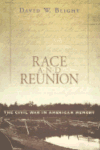 |
 |
|
|
||||||
| Home |
Search |
Events |
Business Section |
Scholarly Section |
Discounted Books |
About Us & Contact |
|
|
||||||
|
Spring 2001 |
|
David Blight Selected Bibliography Race and Reunion: The Civil War in American Memory In this history, Blight delves deeply into the shifting meanings of death and sacrifice, Reconstruction, soldiers' reminiscences of battle, the idea of the Lost Cause, the ritual of Memorial Day, and resurrects African-American voices and memories of the war and the efforts to preserve the emancipationist legacy in the midst of a culture built on its denial. Frederick Douglass' Civil War: Keeping Faith in Jubilee Explores the effect of the Civil War and Reconstruction on the thought of the best known block orator, newspaper editor, and abolitionist of the 19th century, probing the tension between his private views and his public role. An intellectual biography analyzing the impact of the Civil War on Douglass' (1817-1895) life and thought and, more generally, on the Afro-American experience. Union and Emancipation: Seven leading historians offer new perspectives on the issues of race and politics in American Society from the antebellum era to the aftermath of Reconstruction. The authors, all trained by Richard H. Sewell at the University of Wisconsin - Madison, address two major themes: the politics of sectional conflict prior to the Civil War, illuminated through ideological and institutional inquiry; and the central importance of race, slavery, and emancipation in shaping American political culture and social memory. Contributors consider the national culture, the centrality of the nation-state in understanding American history, the place of race in redefining what it meant to be an American, the way the Civil War helped to redefine the nature of the 'political, ' and of 'citizenship, ' and the significance of political parties through the ideas and interests that motivate them. The collection, with its dual themes of union and emancipation, will provoke debate, offer insight, and challenge recent interpretations of this turbulent period in American history. The Columbian Orator First published in 1797, The Columbian Orator helped shape the American mind for the next half century, going through some 23 editions and totaling 200,000 copies in sales. The book was read by virtually every American schoolboy in the first half of the 19th century. As a slave youth, Frederick Douglass owned just one book, and read it frequently, referring to it as a "gem" and his "rich treasure." "David Blight has done historians and literary critics a profound service by so expertly editing this germinal text. A must read for scholars of American and African American studies." --Henry Louis Gates, Jr., Harvard University The Souls of Black Folk When This Cruel War Is Over: The Civil War Letters of Charles Harvey Brewster Narrative of the Life of Frederick Douglass, An American Slave |
||||
Home | Search | Business | Scholarly | Bargains | Events | About Us | Contact
Copyright 2001 Harvard Book Store
Phone: 800-542-READ FAX: 617-497-1158
